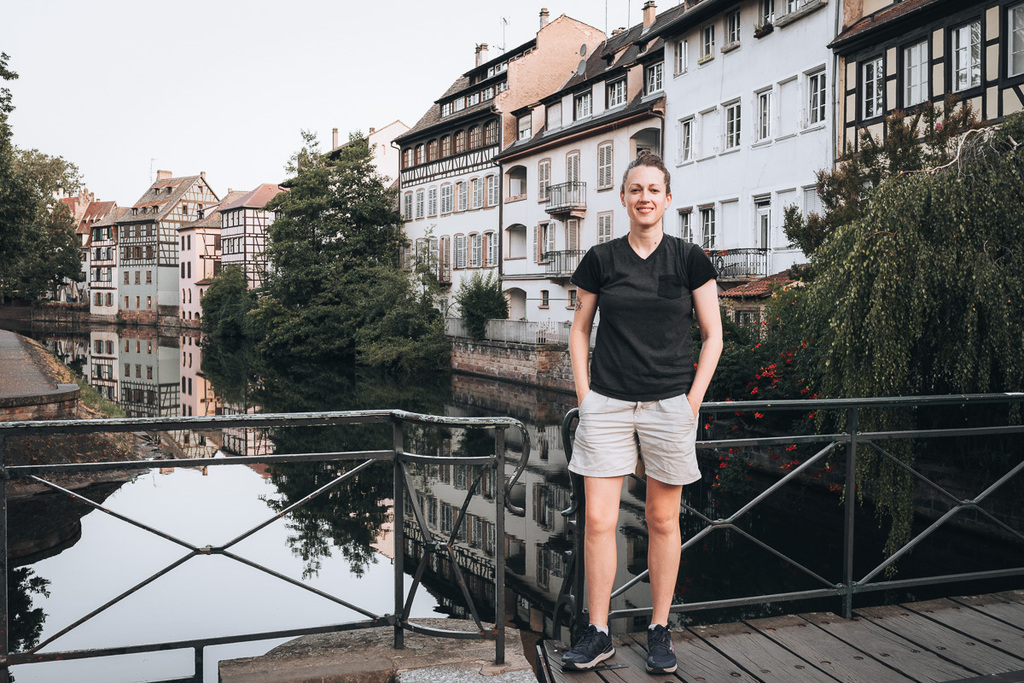France: A Visual Feast For Travelers
Traveling to and around France offers a myriad of unique experiences that are hard to find elsewhere. One of the most compelling reasons to visit France is its rich history and culture. It’s home to iconic landmarks like the Eiffel Tower, Omaha Beach, Basilique Notre-Dame de la Garde, and, of course, the Louvre Museum.
The country's geography is also incredibly diverse. From the sun-drenched coastlines of the French Riviera to the snow-capped Alps, there's a stunning view around every corner. Then, there’s the food. French cuisine is revered worldwide. Whether you're indulging in a flaky croissant at a Parisian café or savoring a hearty cassoulet in the South, the culinary experiences alone make France worth visiting.
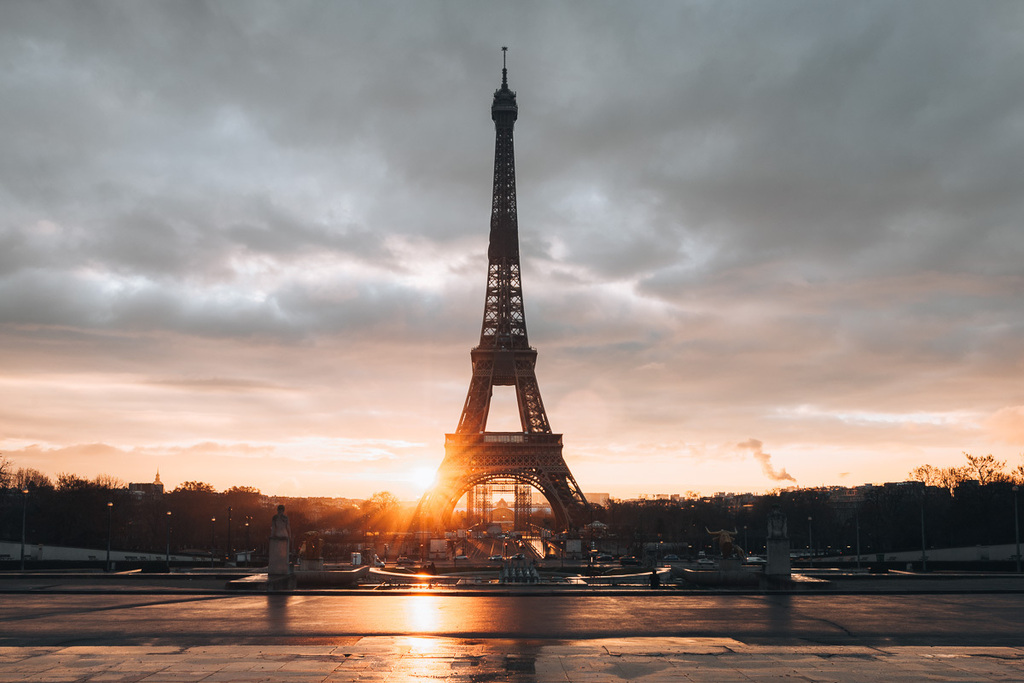
Eiffel Tower in Paris at Sunrise
And with so many things to see and do, France's infrastructure makes it easy to explore. Efficient public transportation and well-maintained roads make traveling around the country a breeze. Plus, France's location in central Europe makes it an excellent starting point for exploring the rest of the continent.
A 2-Week Itinerary For Exploring France
To truly immerse yourself in all the top destinations that this beautiful country has to offer, I recommend two to three weeks. Below I’ve put together a two-week itinerary that covers some of the most incredible sites in France. There’s also a variation so you can choose which works best for you.
Days 1-3: Paris
Start your journey in the capital city, Paris. Explore iconic landmarks like the Eiffel Tower, the Notre Dame Cathedral, and the Louvre Museum. Wander along the Seine, visit charming neighborhoods like Montmartre, and enjoy an espresso at a café. If you have extra time, a day in Versailles is a must.
Days 4-6: Loire Valley
Next, head to the Loire Valley, famous for its stunning chateaus and vineyards. Spend a couple of days exploring Château de Chenonceau, Château de Chambord, and enjoy some wine tasting.
Days 7-9: Provence
Travel south to Provence, where you can explore the historic city of Avignon, visit the Roman ruins in Arles, and enjoy the lavender fields and vineyards around Saint-Rémy-de-Provence.
Days 10-11: Burgundy
Then, head to Burgundy. Here you’ll find world-class vineyards, quaint villages, and incredible historical landmarks. Visit Dijon, known for its mustard, and the magnificent Palace of the Dukes of Burgundy.
Days 12-13: Alsace
Spend a day in Strasbourg, exploring its medieval architecture and charming canals. Visit the Alsace Wine Route for a taste of the region's renowned white wines.
Day 14: Return to Paris
Return to Paris for any last-minute sightseeing or shopping before your departure.
If you prefer to visit the south of France, then I recommend this alternative itinerary for days 10-13.
Days 10-13: French Riviera (Côte d'Azur)
Continue to the French Riviera, where you can relax on the beaches of Nice, visit the glitzy city-state of Monaco, and explore the glamorous city of Cannes.
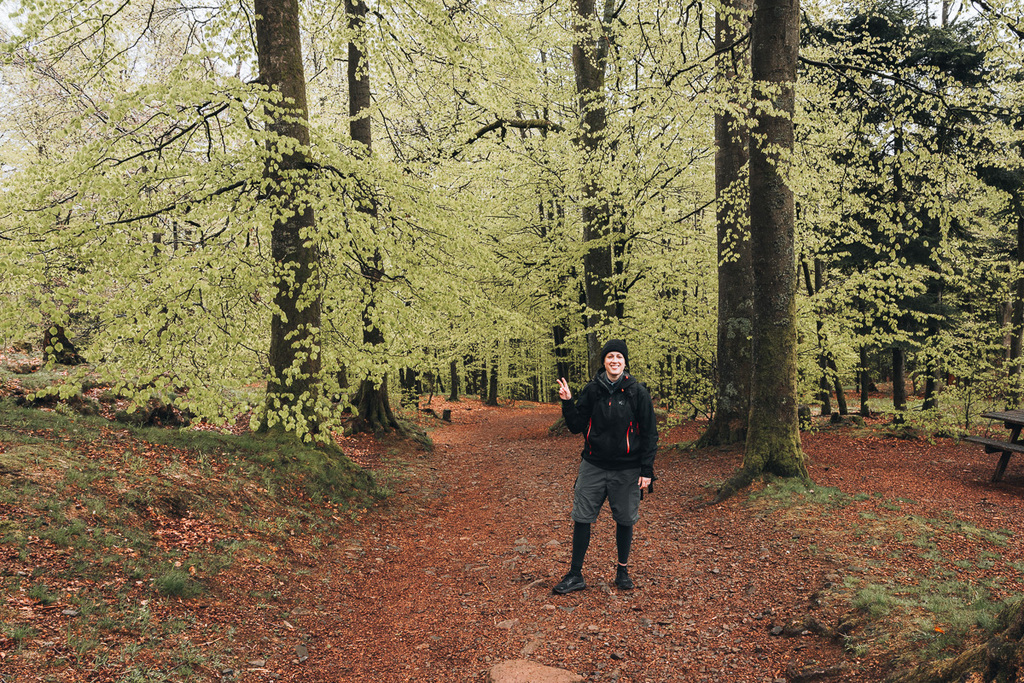
Jen Ciesielski hiking in France
Hidden Gems of France: Exploring Beyond Paris
France is a country that's full of hidden gems. And while there are a ton of reasons to visit Paris, these lesser-known places are definitely worth exploring.
The first one that comes to mind is Colmar. Known as Little Venice, this is one of the most beautiful towns in Alsace, and eastern France, in general. Its colorful half-timbered houses, winding canals, and flower-decked streets make it a picturesque destination.
Then, there is Lyon. While it's the third-largest city in France, it’s often overshadowed by Paris and Nice. Known for its historic architecture, vibrant cultural scene, and gastronomy, it’s a city that will charm you with its authenticity.
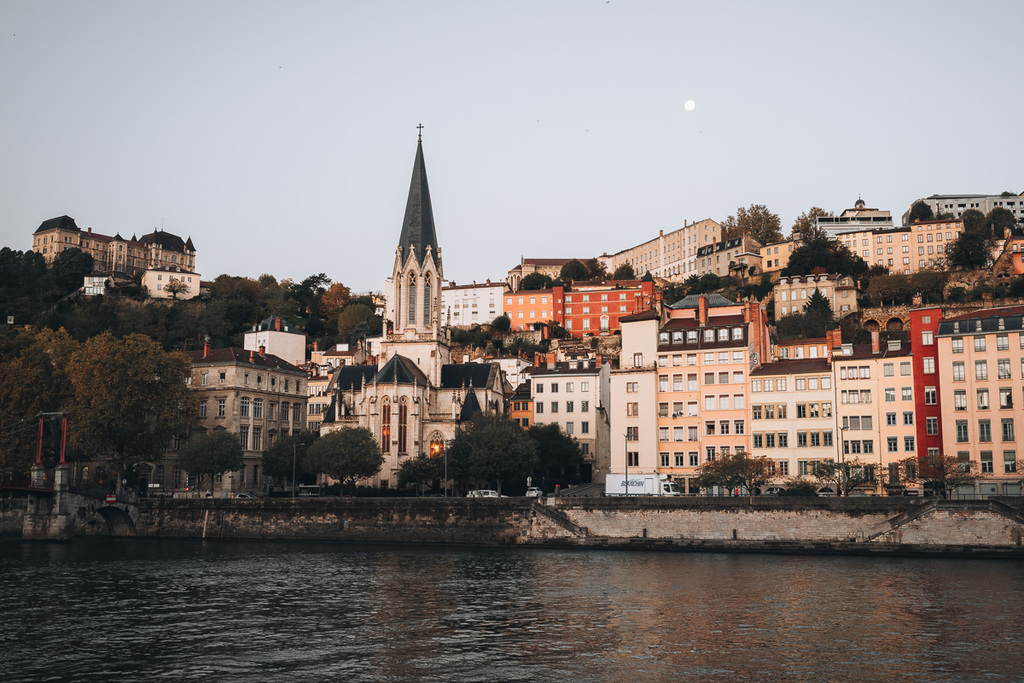
Lyon at Sunrise
But one of my favorite hidden gems is Reims. As the unofficial capital of the Champagne region, you'll find world-renowned Champagne houses, fascinating museums, and beautiful architecture. This is also where the kings of France were coronated. You can visit the coronation site at the Reims Cathedral and then tour the Palace of Tau, where the banquets were held afterward.
Finally, there’s La Camargue. A natural region located in the south, it's known for its unique landscape encompassing salt pans and marshland. It's also home to a rich variety of wildlife including flamingos and white horses.
Outdoor Activities To Do In France
France is an outdoor lover's paradise. It’s one of the biggest reasons why I love living here. And there are a ton of insanely fun outdoor activities to try.
The Loire Valley, known for its stunning chateaus and vineyards, is also a fantastic place to cycle. The mostly flat terrain and scenic landscapes make it an enjoyable ride.
But hiking in the Vosges Mountains is my all-time favorite. The Vosges range offers trails for both casual walkers and serious hikers. And it’s mostly unexplored by travelers, so you can expect tourist-free trails. I recommend hiking to Ballon des Vosges. As the highest point, you’ll have some truly incredible views of the region.
If you love to ski, then skiing in Chamonix is incredible. It’s one of the top skiing destinations in the world. You can also go snowboarding, snowshoeing, and ice climbing.
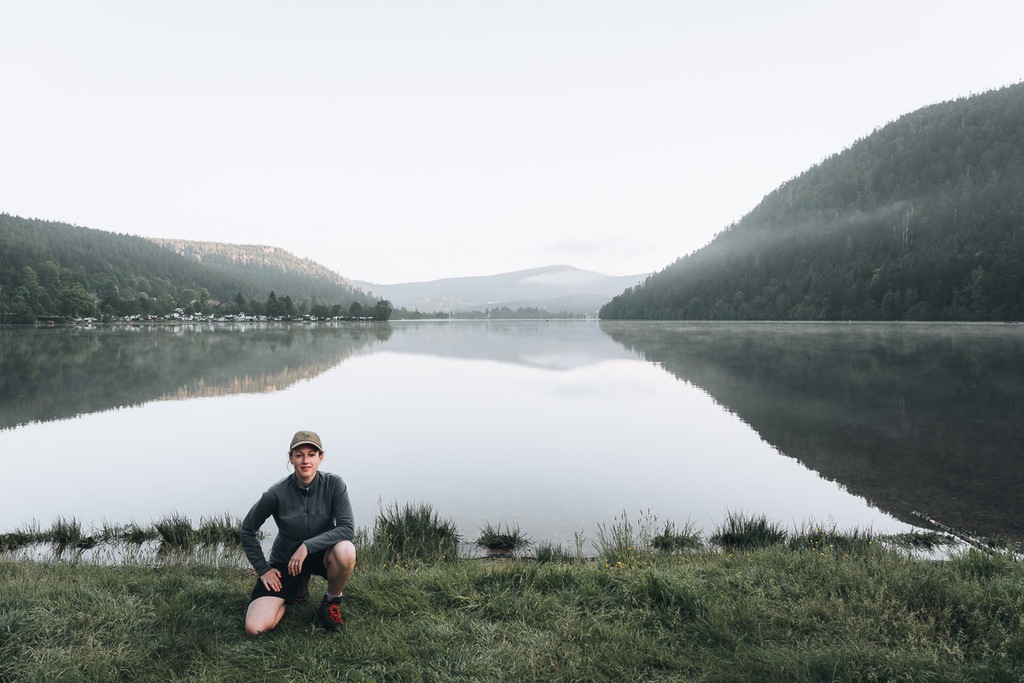
Jen Ciesielski hiking in the Vosges Mountains in France
Ideal Budget To Explore France
Daily costs can vary depending on your travel style, whether you're a budget backpacker or prefer a more luxurious experience. It’s also dependent on where you stay. Bigger cities like Paris and Lyon will be far more expensive than places like Strasbourg.
For a budget traveler, a hostel dorm bed can cost around $30-$50 per night. Mid-range travelers can opt for a private Airbnb or a 3-star hotel, which could range between $80-$120 per night. Luxury travelers may spend $200 or more per night for a high-end hotel.
If you shop at local grocery stores and markets, you can expect to spend $10-$15 on food per day. Dining out at mid-range restaurants will be pricier, expect to spend around $35-$50 per day. For fine dining experiences, the cost could easily exceed $100 per day.
Using public transportation like buses, trams, or metros can cost around $2-$3 per trip. If you plan to use public transport extensively, consider getting a day or multi-ride pass. Taxis are expensive, so if you can avoid them, you’ll save a ton of money.
Entrance fees to museums, landmarks, and attractions can vary widely. Many major museums, especially in Paris, charge $10-$20 for admission. Some attractions may cost more, while others are free.
If you plan in advance, you can often find deals, discounts, and combo tickets that will save you a lot of money.
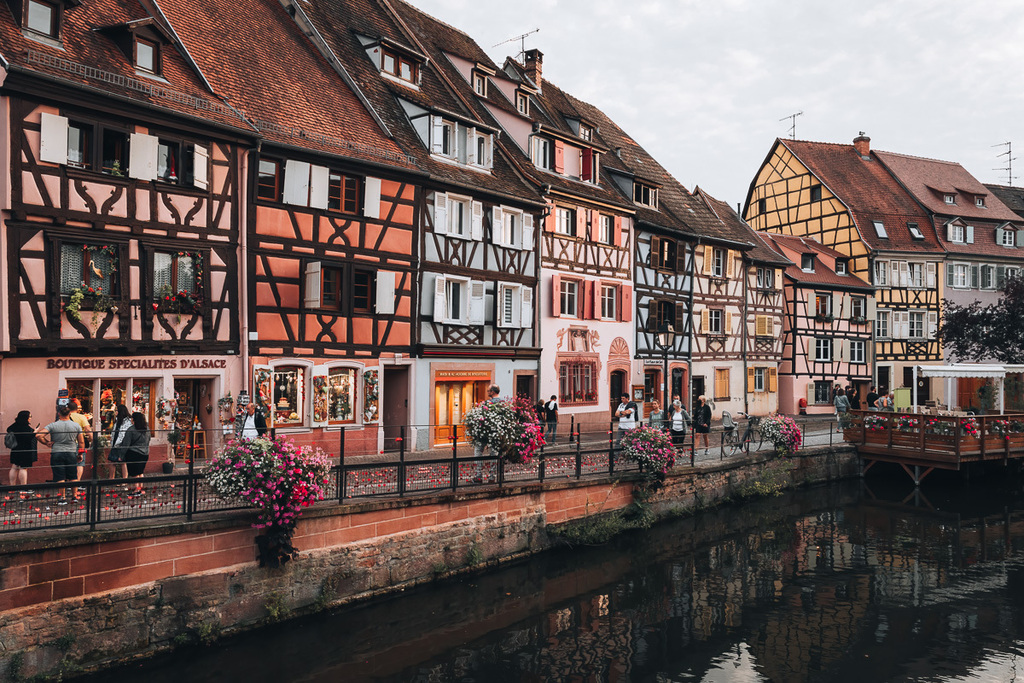
Most Beautiful Street in Colmar France
Best Hotel/Hostel To Stay in France For Backpackers & Digital Nomads
France offers a wealth of options for backpackers and digital nomads, with its diverse regions, vibrant cities, and picturesque towns. However, some places have more amenities that are suited for digital nomads.
As the capital city, Paris offers plenty of coworking spaces, cafés, and cultural attractions. Not only that but there are a ton of hostels to choose from. It’s easy to meet people and you’ll have all the advantages of a big city.
If you’re looking for something cheaper than Paris, then Lyon is the next best option. It’s most known for its culinary scene and attractions, but it also has a diverse demographic. From my experience, this is one of the best places to live in France for expats.
For good weather, nothing beats Nice. Located along the French Riviera, it’s known for its sunny weather, beautiful beaches, and relaxed lifestyle. It's one of the most welcoming destinations for digital nomads owing to the flexible work-life balance.
Then, there’s Strasbourg. This charming city offers a blend of French and German influences evident in its architecture, culture, and cuisine. It’s also home to several co-working spaces and the affordability is unbeatable.
Best Time To Travel In France
The best time to travel to France largely depends on your preferences for weather, crowd sizes, and activities.
If you're looking for pleasant weather and fewer tourists, Spring (April-May) and Autumn (September-October) are the best times. The weather is generally mild and enjoyable, and the tourist crowds have usually thinned out.
The summer months (June–August) are also a great time to visit France, especially if you're interested in festivals and outdoor events. However, be prepared for larger crowds and higher prices as this is peak tourist season.
For those who enjoy winter sports, the winter months could be the best time to visit regions like the French Alps for skiing.
If cost is a major factor, consider traveling during the off-season months of January, March, September, October, and November. Flight prices and accommodation rates are typically cheaper during these months due to lower demand.
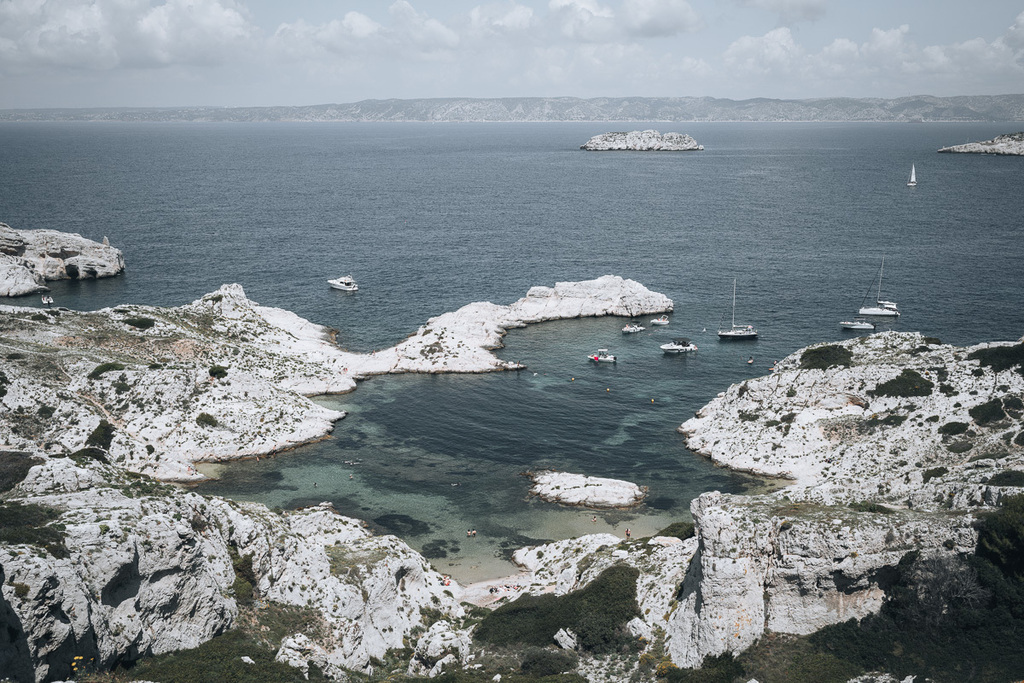
Southern Coast of France
Essential Safety Tips For Solo Travelers In France
I have traveled all over France as a solo female, and, in general, it is very safe. There are, however, a few precautions you can take.
Always be aware of your surroundings, especially when you're outside your comfort zone.
Limit your alcohol intake to stay alert and maintain your judgment.
Choose a reputable establishment in a safe neighborhood for your accommodation. Sometimes the cheapest option is not always the safest.
Stick to well-populated, well-lit areas at night.
Keep a list of emergency contacts, including the local embassy or consulate, on hand.
How Difficult Is It To Enter France
Entering France as an expat is, for the most part, a straightforward process, but it does require careful planning.
The type of visa you need depends on the length and purpose of your stay as well as your nationality. For short stays up to 90 days, most nationalities don’t need a visa. But be sure to check the requirements for your specific situation.
If you plan to work and live in France for longer than three months, you'll most likely need a long-stay visa. And this process can take a long time, depending on your reason for staying.
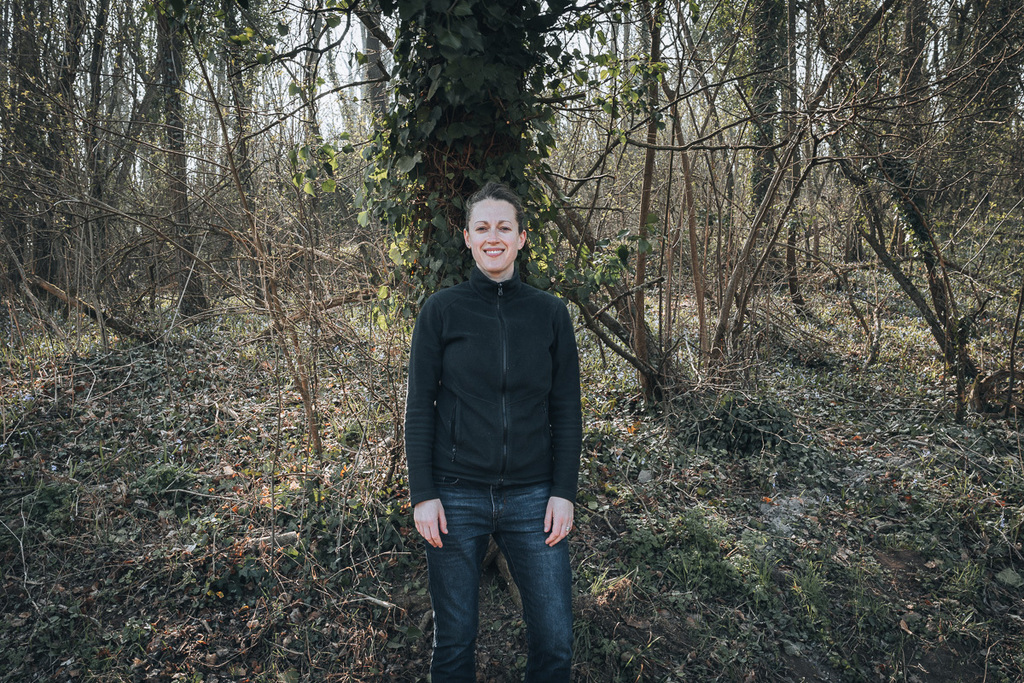
Jen Ciesielski hiking in the spring in Alsace France
Best Transportation Options To Get Around France
France has an extensive public transportation system, which makes it very easy and affordable to get around.
France's state-owned SNCF is one of the best rail networks in Europe, offering fast and frequent service. The high-speed TGV system connects Paris to many regional capitals. It’s the fastest way to travel. Then, within each region, there are regional trains that are cheap and efficient.
Most big cities have some form of public transit. This includes metros, trams, and buses. You can usually buy a 10-ride pass at a discounted price. And, if you download the local transport app on your phone, you’ll save even more money.
The cheapest way to travel is by bus. There are long-distance bus services that go to most major cities. The two most used companies are Flixbus and BlaBlaCar. They are on time, reliable, and affordable.
Popular Cuisines In France
France is world-renowned for its culinary diversity and innovation. And there are definitely some unique dishes to try.
The first one that comes to mind is Escargots. This is a snail cooked with garlic, butter, and parsley. For me, this was the most exotic thing I’ve tried in France. And this is coming from someone who is not very adventurous with food.
Frog legs are also common and are considered a delicacy. They usually come deep-fried, but you’ll also find them sautéed in butter and garlic.
Perhaps the most exotic type of food is Foie Gras. This rich, buttery dish is made from the liver of a duck or goose that has been specially fattened. It’s not my favorite, but it’s something to try.
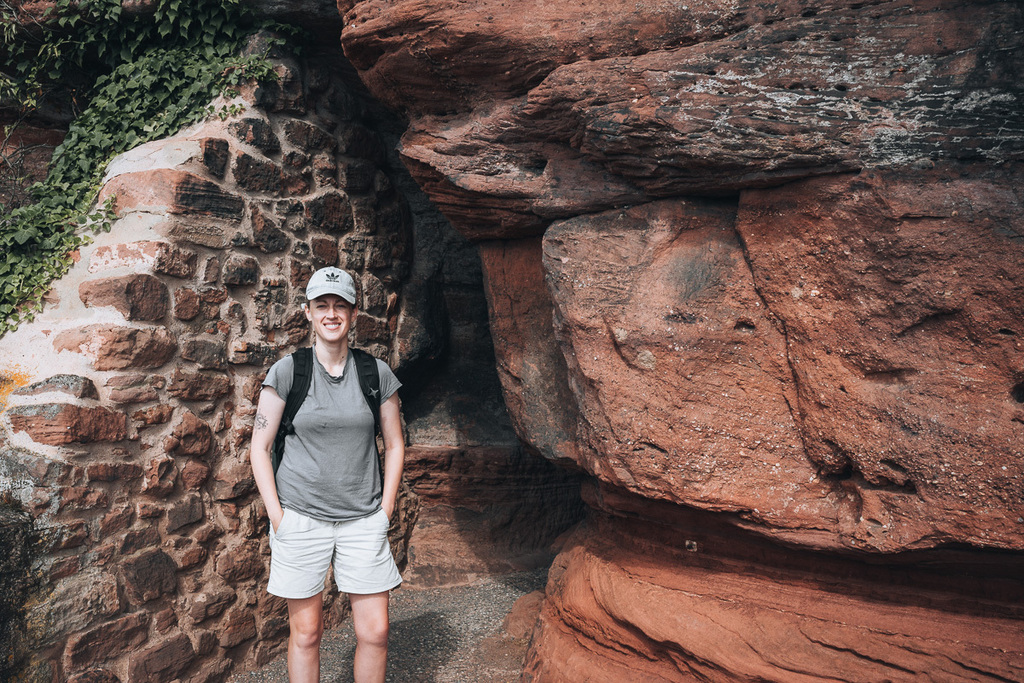
Jen Ciesielski hiking in Alsace
Unique Experiences Available In France
France offers a plethora of unique experiences that cater to different interests, from history and culture to food and adventure. Here are some of the most unique:
Cycling in the Lavender Fields of Provence: In mid-June to late August, explore the Valensole Plateau, the Luberon Valley, and the Sault Plateau, well known for its 'blue gold,' lavender. These idyllic fields are nothing shy of incredible and the best way to visit is by bike.
Learn French in Paris: It’s no secret that the main language in Paris is French. So, what better place to improve your skills? There are tons of affordable tutors and courses to choose from. And of the experiences I’ve had in France, this was my favorite. It’s the perfect way to connect with the culture and make your time here that much more rewarding.
Climbing Europe's Highest Sand Dune at The Dune du Pilat: Offering stunning views over the Atlantic Ocean and the surrounding forest. It’s a long way to the top and quite a workout, but you won’t regret it. On the way down, there’s even more adventure to be had. You can paraglide or slide right to the shore.
Hot Air Balloon Ride Over Loire Valley: Experience the breathtaking beauty of the Loire Valley from above with a hot air balloon ride. And, if you go early in the morning, you’ll get to watch the sky fill with radiant hues of orange and pink. There’s no better view or unique way to visit this incredible region.
Tour the Secret Passageways in Lyon: Lyon is known for its hidden passageways or traboules, a network of around 400 secret corridors that have been around for centuries. These mysterious passages are especially prevalent in the Vieux Lyon and the La Croix-Rousse districts. They can be tricky to find so be sure to bring a good map.
Working Opportunities For Backpackers In France
There are a variety of opportunities for backpackers who want to travel for a few months in France. Many hostels offer work exchange programs where you can work in roles such as reception in exchange for free accommodation.
Websites like Workaway list opportunities where you can exchange your skills for accommodation. This could involve working in hostels, farms, or teaching languages.
Working as an au pair for a local family is another popular option. This generally involves childcare and light housework in exchange for room, board, and sometimes a small wage. There’s even a visa for this type of work, so it’s worth looking into.
If you're fluent in English, tutoring or teaching in schools or language institutes could be an option. This is not as lucrative as it once was, but there are still opportunities available.
Keep in mind that you might need a work visa to legally work in France. It's important to check the latest requirements and ensure you have the correct permissions before you start working.
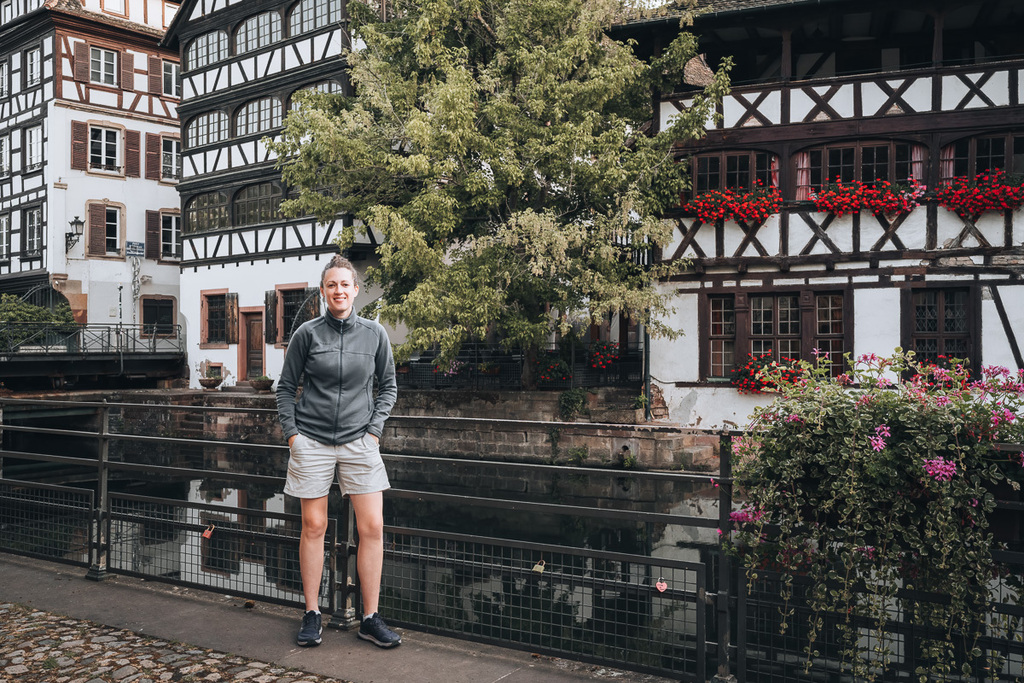
Jen Ciesielski in Strasbourg's La Petite France
My Suggestions For A Safe Trip To France
If you're planning to travel to France, there are several important things to remember to ensure a safe and enjoyable trip. Here are some key tips based on my experience:
Learn Basic French: While many people in France speak English, particularly in tourist areas, knowing a few basic phrases can go a long way. And always say "Bonjour" (Hello) before starting a conversation with locals. It's seen as polite and respectful.
Explore Beyond Paris: While Paris is captivating, France has much more to offer. Don't miss out on the stunning landscapes of Provence, the historic Normandy beaches, or the beautiful vineyards of Bordeaux.
Embrace the Pace: The French take their time, whether it's during a meal or a business meeting. Try to adapt to this slower pace and enjoy the moment.
Healthcare Access: Pharmacies are widespread in France and are the first point of contact for minor health issues. They're easy to spot with their green crosses outside.
Public Transportation: France has an excellent public transportation system. Consider getting a rail pass if you plan to travel extensively by train.
Tipping: Service is included in your restaurant bill, but it's customary to leave a tip for exceptional service.
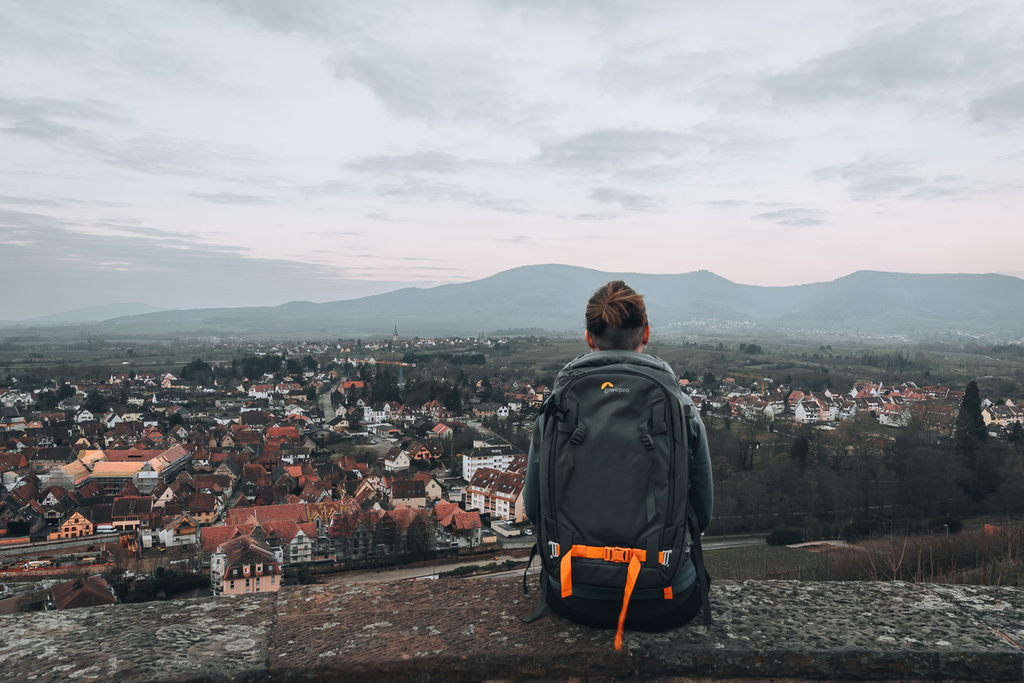
Jen Ciesielski watching the sun rise over a small town in Alsace
